Chris Jones's Blog, page 19
January 5, 2017
Success lies at the crossroads between experience and opportunity


If success lies at the crossroads between experience and opportunity, then the simple act of creative collaboration is by far the best strategy to increase your experience and opportunities.
When we create, be it writing, making movies, marketing our stuff, we more often than not work in partnership with others, sometimes even a bigger team. Relationships are made, debts and favours exchanged, experience gained…
It’s like each major act of creativity is like throwing a stone in a pond. The ripples spread out and often, keep going, sometimes even for decades. That same pond has others creating too, and their ripples are bound to interact with yours too, creating yet more crossroads and opportunities.
By creating and following through, and in the process, working with others, our chances of the ‘magic’ happening expand hugely.
And this is how the Audiobook for Twisted50 came about.
Steph Wessell, one of the super talented writers in Twisted50, posted on Facebook about her success. An actress who she had worked with eight years ago contacted her to congratulate her on her success, and asked if there was an audiobook planned.
Turns out the actress, Helen Lloyd, was also a super experienced Audiobook narrator and producer.
Steph pitched the project and connected me with Helen… and we now have a nearly completed audiobook that has been huge amounts of fun to produce.
If Steph had not made the short film (below) eight years ago, proven herself a hard worker and collaborator, and created a relationship, Helen would not have known about Twisted50 and almost certainly we would have offered to get involved. And we would not have an audiobook.
Emerging filmmakers often ask me what’s the best strategy for success? It’s simple really. Work. Work with as many people as you can. Do as many different jobs as you can. Don’t get hung up on money yet, these formative years are more about creating a favour bank, learning at the expense of others, creating relationships and gaining experience. The money will come later if you learn your craft, work hard and prove yourself a collaborator.
None of us can predict how far the ripples will travel, but you do need to toss the stone in the pond to find out. So if like me, you find yourself procrastinating a little too often, start throwing some creative stones in the pond.
Here’s the film Helen, Steph and their team made.
You can listen to excerpts from the audiobook for Twisted50 below (and order it HERE).
And remember, this audiobook features 50 writers, now with 50 voice over artists… that’s a lot of ripples and therefore possibilities.
Onwards and upwards!
Chris Jones
My movies www.LivingSpiritGroup.com
My Facebook www.Facebook.com/ChrisJonesFilmmaker
My Twitter @LivingSpiritPix
Sign up to my mailing list for updates on
events, books and free film making tools
December 6, 2016
Firewalk With Me…
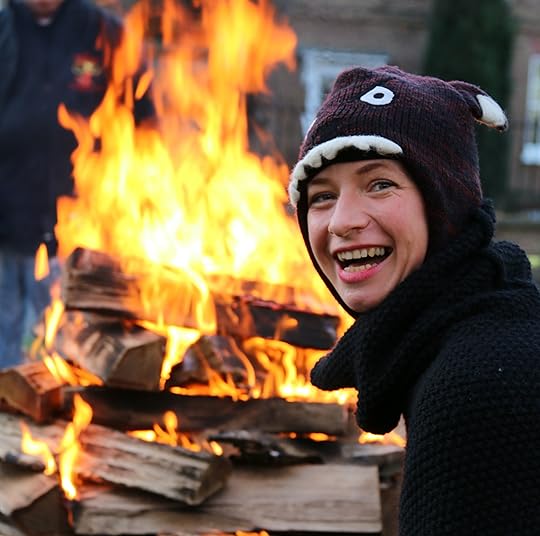
 Last Thursday I led a group of 30 brave screenwriters, barefoot, across 750 degree hot coals in aid of charity.
Last Thursday I led a group of 30 brave screenwriters, barefoot, across 750 degree hot coals in aid of charity.
The experience for everyone present was nothing short of transformational. The firewalk causes everyone, to face very real fear and to overcome it, to inform our bodies that everything will be fine, and finally to take action.
Make no mistake, those embers would cook steak, and quickly. Every one of the firewalkers experienced greater heat than they expected, but also became very clear about their own personal relationships with fear.
I hope you enjoy the video, shot and edited by the very talented Vicky Tolidou.
This firewalk was part of the Talent Campus at the London Screenwriters’ Festival, an intensive professional development program supported by the very lovely people at Creative Skillset.
Chris Jones
www.LondonSWF.com
November 19, 2016
This short film has just been shared 36 times (update 72 times in 24 hours) from my Facebook feed… Why?

Yes, it’s a short film about a girl underwater, who farts. Twice. It’s remarkable. That’s why it has been shared and commented on so much.
In all seriousness, what can we learn from this flatulent success? Because at the end of the day, my work, your work, all our work, is up against this film and others that are also remarkable. So why did it get shared so much?
It’s funny
Certainly, in the interweb age, ‘funny’ will always get a click. Fundamentally, it want’s to entertain us and we know it, and so we give it our time. So… does mine or work have such a passion to entertain?
It’s short and to the point
It asks ONLY the amount of time needed and not one second more. Is our work as lean?
It tells the truth
We all fart. And great art shines a light on a truth not everyone wants to confront. Does our work tell the truth also?
It has contrast
Human beings love contrast, big and small, black and white, good and evil, sweet and sour… Here we have artistic images and music that contrast with the vulgar truth of farting. It just works. Where in our own work is the contrast?
It pushes boundaries
All great art pushes boundaries, breaks taboos… This gently nudges a social boundary and does it with a knowing smile. And we are all won over by the audaciousness. Where in our work can we push boundaries further?
It’s immediately accessible.
Immediately. Is our work as accessible?
It’s executed with artistic flair
And finally, there is some art going on. It’s a ‘classical’ ass, wonderfully lit and graded, with slow motion and slow motion sound. It’s not just some kid farting in a swimming pool on holiday. It’s quite beautiful. The music backs up the ‘art’ as well as contrasting wonderfully too.
Who knew I could write this many words about a girl farting under water.
PS – I do hope that as, icing on the cake, this is an old school practical special effect with a hose and some air. To go to such lengths would be awesome. Though Occam’s razor does come to mind.
Onwards and upwards!
Chris Jones
My movies www.LivingSpiritGroup.com
My Facebook www.Facebook.com/ChrisJonesFilmmaker
My Twitter @LivingSpiritPix
Sign up to my mailing list for updates on
events, books and free film making tools
November 15, 2016
Are we killing our creativity with social media?

 Facebook, Twitter and all social media is amazing at click-baiting us into reading updates from friends, from people we call friends (but frankly don’t know), and advertisers slipped inbetween posts.
Facebook, Twitter and all social media is amazing at click-baiting us into reading updates from friends, from people we call friends (but frankly don’t know), and advertisers slipped inbetween posts.
I used to value my time in the loo. It was genuine ‘blue sky’ time when I could think for a moment.
But now, that has been lost to Facebook. Maybe this is too much information, but I am guessing many others spend a great deal of time in those intimate moments alone flicking the smartphone screen up, looking for that delicious hook to draw us in.
The same is true of so many other moments in my life – out walking, on the tube, waiting for something… in fact all momentary pauses in life… All of these times used to be times when I could reflect, imagine and figure out creative conundrums.
I now appear to have lost most of that time to angry posts about Donald Trump and Brexit.
So my question is this? How much ‘creative’ time am I giving up to social media? For me, it’s too much time. Maybe it’s time to moderate a little and get back to using Social Media for my ends as opposed to being used by it.
For all of us, maybe it’s time to take back those stolen moments? For a day or two, why not try switching off social media and allowing your mind to float away into ideas, problem solving and perhaps even nothing much at all.
Of course the irony that you may have been led to this post FROM social media is not lost on me. It’s just an observation. And that any conversation arising from this post may also take place on social media. Perhaps then, everything is good, but only in moderation.
Onwards and upwards!
Chris Jones
My movies www.LivingSpiritGroup.com
My Facebook www.Facebook.com/ChrisJonesFilmmaker
My Twitter @LivingSpiritPix
Sign up to my mailing list for updates on
events, books and free film making tools
October 20, 2016
How long was your post production? How about 30 years?

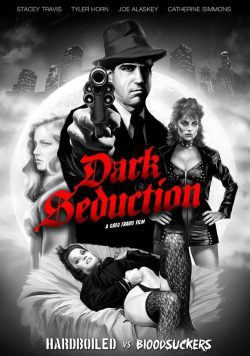 One of the core skills any filmmaker must have is tenacity.
One of the core skills any filmmaker must have is tenacity.
In many ways, filmmaking (in fact any creative enterprise) is about last woman or man standing.
Greg Travis knows all about this, his film ‘Dark Seduction’ a vampire noir movie was shot in 1984 and just recently completed. Seriously. Thirty years of post production.
His documentary (below) about the film is no doubt more fascinating than the film itself, and in many ways it’s as much an insight into tenacity as it is a cautionary tale about due diligence.
The technical problems that he ran into in post production should not really have stalled him the way that it did – the lesson here being ‘have a clear and tested post production route and schedule for your film and stick to it’.
Yes, many low budget films do get stuck in post, but yikes, Greg takes the record with three decades!
Cautionary, fascinating and downright astonishing. Enjoy the documentary below.
Onwards and upwards!
Chris Jones
My movies www.LivingSpiritGroup.com
My Facebook www.Facebook.com/ChrisJonesFilmmaker
My Twitter @LivingSpiritPix
Sign up to my mailing list for updates on events, books and free film making tools
August 20, 2016
10 things I learned from my first feature by Andy Mark Simpson
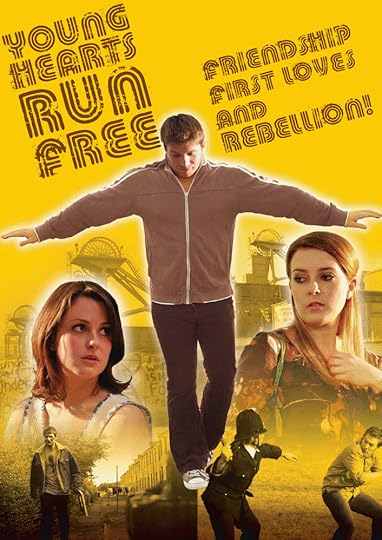
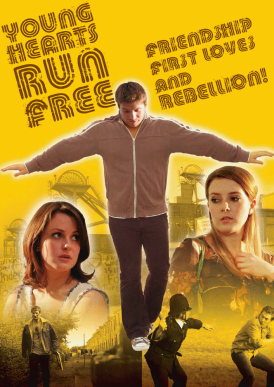 I wrote, directed and produced my self-funded debut feature ‘Young Hearts Run Free’ for under £10k (it’s a 1970s period film!) and then self-distributed in cinemas around the UK and the USA. That’s a very difficult eight year journey! It can be difficult to move on to your next projects so now I’m making a short film which will help get my next feature film made (Check out Waterbabies). The more you get it right with your first film the more opportunities you will have in future.
I wrote, directed and produced my self-funded debut feature ‘Young Hearts Run Free’ for under £10k (it’s a 1970s period film!) and then self-distributed in cinemas around the UK and the USA. That’s a very difficult eight year journey! It can be difficult to move on to your next projects so now I’m making a short film which will help get my next feature film made (Check out Waterbabies). The more you get it right with your first film the more opportunities you will have in future.
So, here are ten lessons I learned from making and distributing my first feature film:
1-The idea needs to be fresh.
Not completely new but enough of a twist on it. My teenage romance set during a coalminers strike has a similar setting and lightness of tone to ‘Billy Elliott’ and ‘Pride’ but the central idea is nowhere near as fresh.
2-Say something- controversy is good.
Social issue docs do well because they have a clear message supported by an identifiable audience. Your feature can do that- mine didn’t. If you’re making a £7k feature with no well-known cast then don’t aim for the middle ground, make something that will jump up and kick people in the balls. Your mission is to get noticed.
3-Know your target audience, and talk to them, before you make the film.
It’s not enough to believe they’re ‘out there’. Get your target audience involved as early because it is useful during every step of the process, not just in distribution. Use them in research for the subject matter your script, for crowd-funding, as extras in the film and even as tests during post-production. They should be already queuing up to see the film before it is released, otherwise it can be too late. I only did a tiny bit of this, nowhere near enough. It also helps if your target audience communicates online, so you can use facebook etc; not via a written newsletter posted out once every 3 months (yes this happened to me).
4-Your script isn’t ready yet. Do another draft.
You almost always need another draft of the script. Once your trusted writer friends have read it, hire a proper script reader service- it’s £50-£150 well spent. I learned the hard way only doing a few drafts (about 7) and had to spend a lot of time and money fixing problems with edits and reshoots. My next short and my next feature have had script-readers and 10 drafts so far (was Shortlisted for a Sundance Film Festival ScriptLab so it is paying off.) Script writing is still MAKING your film- it’s one of the most important parts. Keep working on the script while you’re doing everything else.
5-Getting crew on a zero budget is hard.
Crewing is a nightmare if the roles are unpaid. Small crews are good on a low budget but you could do with having a sound-recordist every day.
6-Don’t always follow the ‘micro-budget first film so set it in one location’ mantra.
Yes that often works but as long as you’re sensible about it, sometimes having a smaller crew and hopping round a few free locations, especially outdoors, can be just as cheap and can make it feel more cinematic and less low budget. I know this gave my film the style, look and feel I wanted.
7-Wallpaper is great for doubling up locations
We blu-tacked (genuine 1970s) wallpaper up, did all the scenes in that character’s room and then blu-tacked more up the next day. That small flat gave us a unit base and 6 locations.
8-Your film has to be outstanding.
Good or okay isn’t enough. Mine was quite good (***Total Film, ‘Heartfelt’ The Guardian) but it needs to be excellent to get you anywhere with festivals, sales and word of mouth.
9-Try to sell tickets in advance.
Waiting outside a screening hoping people turn up is highly nerve-wracking, and disheartening when they don’t. It’s like no one coming to your birthday party. Waiting outside knowing you’ve sold out in advance is the best feeling in the world. See lesson 3.
10-Self-distribution is harder than making a film.
You’ll still be working on it 3 or 4 years after the film is finished. Once you get a few cinemas on board it snowballs from there but some cinemas took over a year to get back to me. Arranging self-distribution in the UK is really difficult- crossing over and doing it in the USA is even harder (but a useful learning curve, great new contacts and a lot of fun!). See lesson 3, again.
11-Make short films first
I jumped straight into a feature film and had to start from scratch. Everything to do with making a feature is easier if you’ve made a couple of high quality, festival winning shorts beforehand; your funders, your audience, relationships with festivals, your collaborations with key crew, your filmmaking skills will all be far better. If you’ve had success with short films then you’re already a couple of steps ahead- good luck with your feature.
In order to make the difficult leap to my second feature film, I am making a short film in a similar style. You can check out Waterbabies and help our campaign at www.crowdfunder.co.uk/waterbabiesfilm
Andy Mark Simpson
August 12, 2016
So we got another email from Oscars.org…
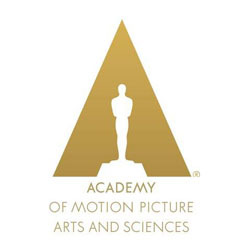
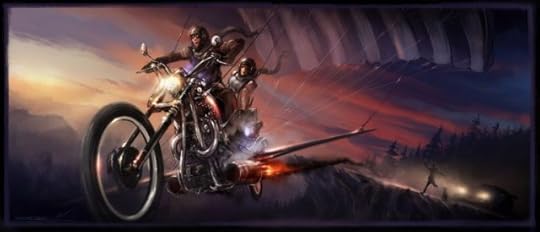
Last month we shared that we were quarter finalists in the 2016 Academy Nicholl Fellowships in Screenwriting. We were delighted as there were 6,915 scripts entered.
This morning we received this email…
‘Congratulations! You have advanced into the Semifinal Round of the 2016 Academy Nicholl Fellowships in Screenwriting. Your script is one of only 149 entries to advance from the Quarterfinal Round. During the Semifinals, four Academy members, drawn from a variety of branches, will read Rocketboy. Over the past half dozen years about ten Semifinalists have progressed into the Finals; the number should be similar this year.’
Suddenly it’s getting real! Woooooo!
Here’s the logline… When Connor, a brilliant but shy young boy meets Becky, a gregarious but troubled young girl, they embark on a extraordinary journey that might… just might… take them all the way to the moon.
Chris Jones
www.LondonSWF.com
July 28, 2016
Top tips for directing when you’re the only beginner on set by Kat Wood
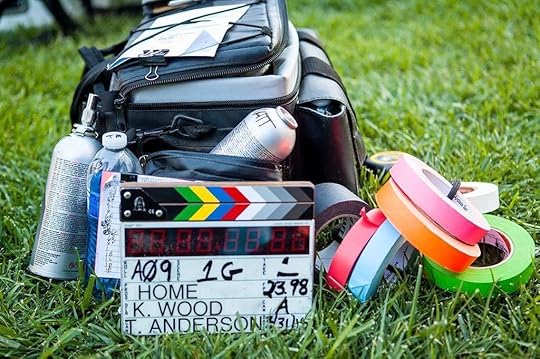
 Earlier this year I directed my first short film. I had always thought that making my first film would be similar to most other people’s first short film experience – it’d be small scale, probably filmed in or around my own house with just a few people to help out. More like a ‘practice and learn’ exercise than anything else.
Earlier this year I directed my first short film. I had always thought that making my first film would be similar to most other people’s first short film experience – it’d be small scale, probably filmed in or around my own house with just a few people to help out. More like a ‘practice and learn’ exercise than anything else.
But then I won the Jameson First Shot Competition, and flew to LA to direct my very first short film starring Academy Award nominee Maggie Gyllenhaal and produced by Kevin Spacey. Every person involved with the film was a professional with way more experience than me. Faced with this learning curve, here are a few tips from my experience.
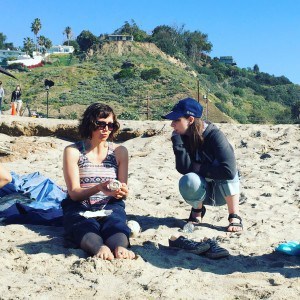 Be prepared
Be prepared
I’d been planning to direct for a little while already, so had read a lot of books, watched director’s DVD commentaries, learnt all I could about directing from the internet and asked questions of director friends. This background preparation was invaluable.
Spend time with your actors
You might’ve written the script but they’re the ones who have to bring it to life and make it real. Listen to their ideas and collaborate ahead of the shoot, and make sure you’ve prepared well enough with your DoP so that you can spend lots of time with your actors on set too.
Ask questions
Even if you think it’s a stupid question, ask it. As a complete beginner, it’s also worthwhile throwing in a ‘is there anything else we should’ve covered that we haven’t talked about yet’, with your HoDs.
Be collaborative
The people working with you on your film are all trying to make it better. Get their input and get a better film.
Know your story
As a working screenwriter, my approach is that every directing decision I make should be informed by and in service to the story. If you know your story, then there shouldn’t be many questions that you struggle to answer ahead of the shoot or on set.
Communicate
Make sure that you communicate what you are looking for very clearly, and if you change your mind that’s ok, just say so and be clear about it.
Lead
Even if you have no experience directing like I did, everyone is expecting you to lead. Show confidence even if you don’t feel it, believe in yourself that you can do it and trust your instincts. After all, you can only make the film once!
Kat’s Jameson First Shot film HOME premiered at Paramount in LA on July 30th, and is available to watch on you tube, vimeo and at www.jamesonfirstshot.com.
You can also follow Kat on twitter: @katruthwood
 Kat has a background in broadcast journalism, and works as a professional screenwriter. In 2014 she was voted on to The Tracking Board’s ‘young and hungry’ list, which lists the top 100 emerging writers in Hollywood and is voted for by industry professionals. She currently has three feature scripts under option and her first produced feature, ARTHUR & MERLIN, was released in the UK and US on DVD/VOD at the end of last year. Kat is a John Brabourne Awardee 2016 and is represented by Zero Gravity Management.
Kat has a background in broadcast journalism, and works as a professional screenwriter. In 2014 she was voted on to The Tracking Board’s ‘young and hungry’ list, which lists the top 100 emerging writers in Hollywood and is voted for by industry professionals. She currently has three feature scripts under option and her first produced feature, ARTHUR & MERLIN, was released in the UK and US on DVD/VOD at the end of last year. Kat is a John Brabourne Awardee 2016 and is represented by Zero Gravity Management.
May 23, 2016
How to win the Sci-Fi London 48 Hour Challenge
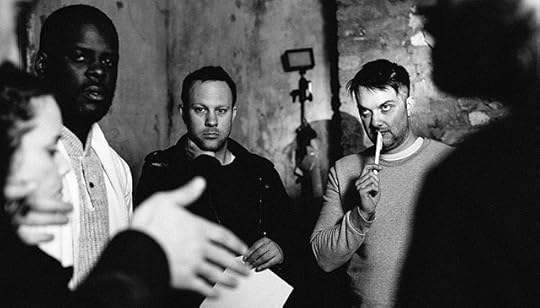
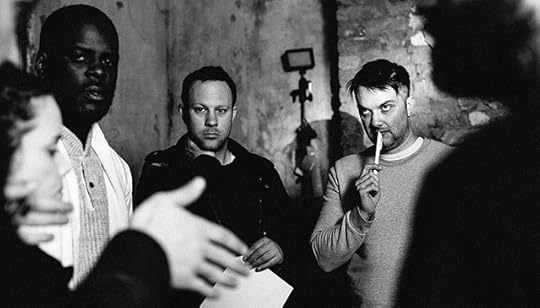
Writer-director Stuart Black spills the secrets
May 4th is said to be a lucky day for Star Wars fans, but for me and my team it was a day for gnawing fingernails right down to the knuckles. Having got into the top ten of the Sci-Fi London 48 Hour Film Challenge, we were impatiently waiting to see whether we’d managed to get a podium place for No Guarantee, the short film we’d made over the course of a weekend back at the beginning of April:
May 4th is said to be a lucky day for Star Wars fans, but for me and my team it was a day for gnawing fingernails right down to the knuckles. Having got into the top ten of the Sci-Fi London 48 Hour Film Challenge, we were impatiently waiting to see whether we’d managed to get a podium place for No Guarantee, the short film we’d made over the course of a weekend back at the beginning of April:
At around 9:30pm, having watched all the best entries at Stratford Picturehouse, we finally found out we’d won and ran down to shake our chewed-up hands with the head of the judging panel Frank Spotnitz (producer of The X-Files and The Man In The High Castle).
It’s taken a few days to recover from the shellshock of winning (and the hangover caused by the party that followed). But now that I can type properly again, it’s as good a time as any to try and figure out where it all went right. So here are seven things I believe helped us get our mitts on the trophy.
Experience: This was our second run at the competition, the team having come together last year to make a film about racists taking over London called Matter Of Fact https://vimeo.com/124813790 That one made the shortlist but missed out on a top three place – which was disappointing at the time, but really it was that experience that proved to be our most valuable asset this time round. It meant we knew full well how little sleep we’d get and what mistakes were likely to might set us back. That said, we still made a whole bunch of different mistakes – but they were less obvious in comparison.
Gareth Edwards: We found that continually invoking this director’s name, since he won the competition in 2008, was a good way to gee up the team: “Guys, if we win this we will be making the next Star Wars movie, okay?” We are now waiting for JJ to call – we have a pretty cool idea for Rogue Two.
Not Cheating: Of course everyone goes into the competition with ideas swirling around in their heads (you’d be braindead not to), but since you get given a title, props and dialogue as part of the contest, it does pay to be able to respond to these. On a side note, this year was hit by a bizarre cheating scandal when one team, whose script was written by a computer, was disqualified from the audience prize after programming the machine to be able to vote for itself, which it did 10,000 times. O-kay. This led to the unfortunate scrapping of the audience vote.
Location: We’d learned from watching previous year’s winners that securing a cinematic space to film in gave you a legitimate head-start. So we decided to put what little cash we had into renting a tumbledown old house near Peckham’s Bussey Building. And voila: instant production values.
Feeling the pain: We absolutely love our brilliant and dedicated actors, but since the story we came up with called for them to be caught in a doomed romance, we needed to see real suffering. Luckily, Justin Marosa was allergic to the dust in the house while Alice Henley was allergic to her costume (we made her a corset out of fibre glass tape – oops).
Coffee: The post-production process was supposed to be wrapped up by midnight on Sunday, but perhaps inevitably it turned into a desperate all-nighter. This meant me and my co-writer/director Nick Mather were basically on espresso duty way into the smallest hours as we tried to keep the team from collapsing at their keyboards. It has to be said, this was the hardest part of the weekend to get through. As someone wise probably once said: Tiredness leads to sensitivity. Sensitivity leads to temper tantrums. Temper tantrums lead to the dark side.
Guerilla-ism: Finally, we have to give serious props to Chris Jones since the core of our team first met at his Guerilla Filmmaking course a few years ago. In all honesty, it was the fact that Chris hypnotised us into thinking we could make a film that kick-started our first attempt. That said, he’s not getting us to walk over red hot coals – ever.
Stuart Black// Fillmmaker
May 18, 2016
Top Ten Tips for Crowdfunding Your Feature Film by Stephen Follows

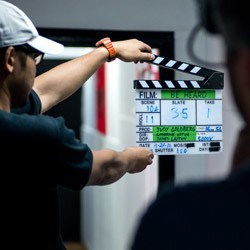 We filmed this short video with Stephen Follows last week to offer a glimpse into what you can expect at his two day masterclass next month (www.SuccessfulCrowdfunding.co.uk)
We filmed this short video with Stephen Follows last week to offer a glimpse into what you can expect at his two day masterclass next month (www.SuccessfulCrowdfunding.co.uk)
It’s amazing when you consider that Kickstarter has now raised over $1bn for indie filmmakers. Let that number settle for a moment. Then ask ‘why don’t I have a piece of that pie?’
In the video Stephen offers tips on…
Ask for what you NEED and you are likely to succeed
How long should your campaign be? The proven sweet spot
Why the day you end your campaign is SO important
It’s not how much you need, it’s how many backers will make it happen?
The single biggest factor in Crowdfunding success
Why you MUST be in your own campaign video
Why being funny in your campaign will reap rewards
Is your video the optimum length? What is the sweet spot?
What is the correlation between number of awards and campaign success?
Why you MUST back other people’s campaigns for your own success
And finally, as a bonus, a top secret way to save 10% on your crowdfunding fees
The bottom line is Crowdfunding is the best way for 90% of filmmakers to get finnanced. See you on the course. www.SuccessfulCrowdfunding.co.uk
Onwards and upwards!
Chris Jones
My movies www.LivingSpiritGroup.com
My Facebook www.Facebook.com/ChrisJonesFilmmaker
My Twitter @LivingSpiritPix
Sign up to my mailing list for updates on
events, books and free film making tools



